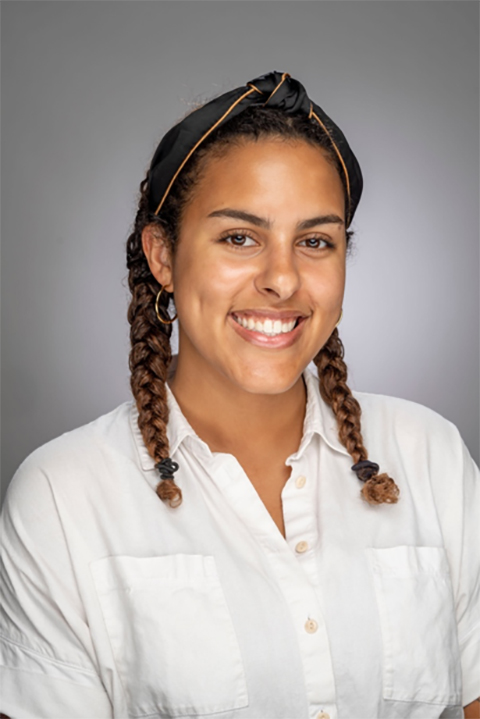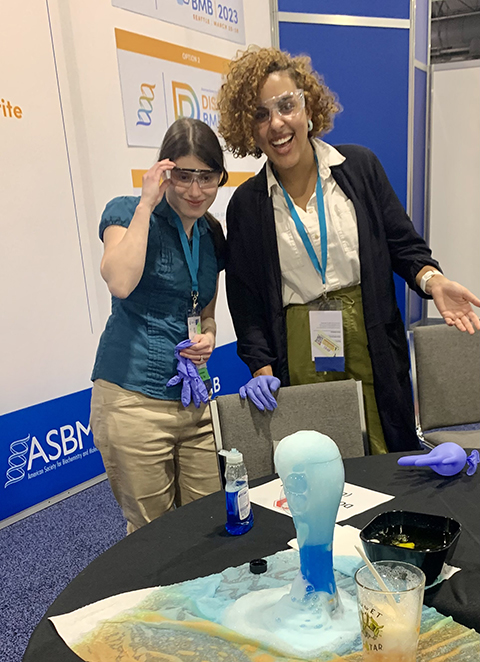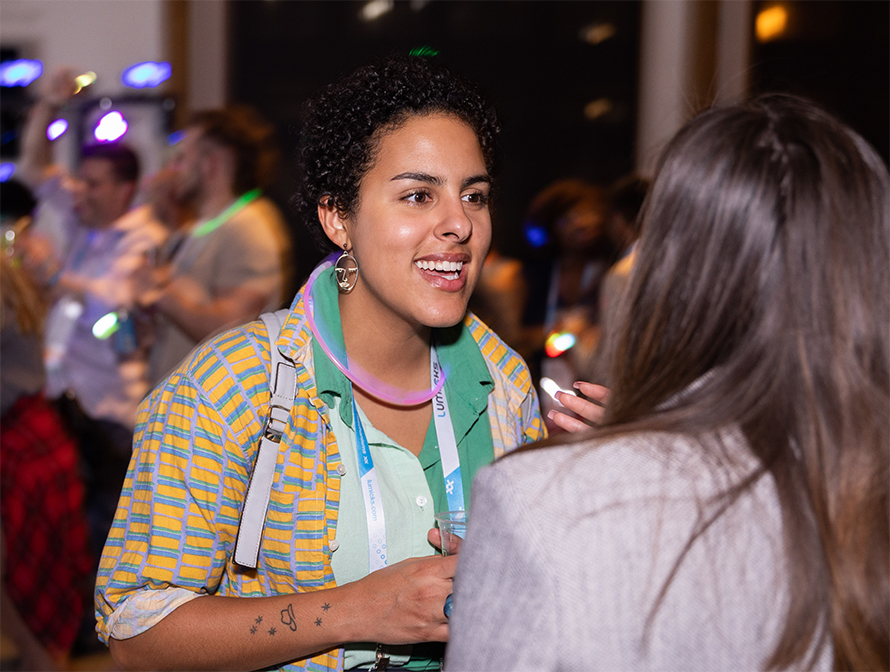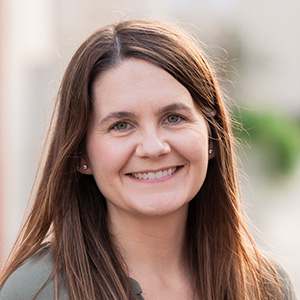Inspired by science — and passing it on
Adriana Norris, a postdoc studying infectious diseases, recently interviewed neuroscientist and scientific communicator Parmvir Bahia for a YouTube video. The two talked about how Bahia got into outreach hoping to increase awareness of what scientific researchers do. Bahia founded an organization called Scientists Inc., which hosts several projects such as a podcast and a sensory-friendly science festival.

“Interviewing Parmvir was particularly enjoyable, as we have become good friends through our work with the SOCC,” Norris said, referring to the American Society for Biochemistry and Molecular Biology’s Science Outreach and Communication Committee.
“From working with Parmvir and during our interview, I've learned the critical importance of involving the target community in planning outreach events. Parmvir exemplifies this approach, and I believe all outreach practitioners should consider it.”
Norris is no stranger to video. In fact, she was invited to apply for the committee because of her work in scientific outreach, including a YouTube channel where she addresses questions about academia that are hard to find answers to. Her most popular video, which had over 3,200 views in one year, breaks down the qualifying exam for her Ph.D. program.
“I always go to YouTube to figure out how to do something,” she said. “When I looked up ‘how do you pass a qualifying exam,’ there wasn’t much.”
Feedback has been overwhelmingly positive, and Norris aims to make unfamiliar terminology and academic processes accessible on YouTube for students applying for graduate school. Questions she initially found challenging included “What is a PI?” and “What is an NIH grant?”
“I felt miles behind when I was interviewing,” she said. “These are things that I am not familiar with, and I am trying to get a Ph.D.”
She said she created the YouTube channel because she wanted people who didn’t have academic backgrounds to know they could still enter academia — they just need to learn about these things.
Norris plans to make her next video about the scientific writing and publishing process.
“It takes so much longer than what anybody told me,” she said, laughing. “I expected something to come out a few months after you first submit it (to a journal). I didn’t fully know that you could submit (a paper), and they would review it, and still reject it.”
Norris encourages others to share what they’ve learned.
“My advice for people who want to get into the social media outreach sphere is to go ahead and just do it,” she said. “Your first video might be rough, but 10 videos in it’s a lot better, and you can learn throughout the process.”
Mentors make a lasting impact
Norris fell in love with biology and scientific inquiry when she was a little girl watching “Jurassic Park.” Her passion was rekindled during her undergraduate studies at Armstrong State University in Georgia.
“I took an Intro to Biology class, and I ended up just loving it so much that I switched my major to biology,” she said. “And that sort of started everything.”

Three women encouraged her to continue the pursuit of science: Jennifer Brofft Bailey, her research mentor; Geneva Demars, a mentor for pedagogical teaching; and Sarah Zingales, her organic chemistry teacher.
“They were inspirations to me and encouraged me to keep working hard,” Norris said. “And they told me about graduate school, which I hadn’t previously considered.”
Norris had early exposure to science and strong women. Her mother was the first Black woman to graduate from the U.S. Coast Guard Academy — instilling the importance of not giving up and pursuing things even if they are challenging — and a chemistry teacher.
As her graduation approached, Norris realized she needed a plan for what came next with a biology degree. She appreciated the honest advice of one mentor regarding how challenging and competitive academia can be — but her mentors still encouraged her to apply to graduate school.
“They wrote me really nice recommendation letters, which was a big deal, I think, for getting into graduate school because I didn’t have that much research experience,” she said. “But I think what really made me stand out was that I had personal relationships with these female mentors.”
Mentorship is a two-way street
When Norris was a graduate student, she partnered with a local science museum in Nashville, where she mentored a high school student. They worked as a team to set up a science exhibit for the public.
“My high-schooler was an inspiration to me,” Norris said. “She already knew what she wanted to do. She loved science.”
“When you are in a mentor position, it is important to ask the mentee what kind of mentorship they need, what kind of feedback is helpful, or how much hands-on things they need,” she said. “You want to make sure you are making an experience that is helpful for them and you don’t blanket everyone that you mentor.”
She also learned that a mentee has to tell the mentor what they need.
“Not all mentors know what they need to ask,” she said. “So you need to be upfront that ‘I need this kind of feedback’ or ‘I need this much time to do things’ … Ask for what you need so your time is being used effectively and you’re getting the mentorship you need.”
Establishing new partnerships
Norris joined Todd Graham’s lab at Vanderbilt University for her graduate work with a focus on lipid transport and metabolism.
“My lab worked on yeast for 20 to 25 years, and when I joined the lab, I was the first person to start working with mice,” she said. “It was an exciting challenge because everything was brand new. Every discovery we made felt new, but it was a lot of having to ask for help.”
Norris created a new mouse model for sex-specific lipid metabolism dysregulation. She enjoyed the independence of her graduate work but knew that asking for help and building collaborative partnerships at Vanderbilt was essential to moving the project forward.
“’Can you show me how to do this?’ ‘Can I come to your lab?’ ‘Can I borrow this reagent?’ It’s a lot of putting yourself out there and asking people to please help you,” she said. “I was constantly reminding myself that ‘it’s okay to ask’ and ‘it’s good to build collaborations.’”
In 2021, Vanderbilt gave Norris the Ann Bernard Martin Award for Excellence in Graduate Research, which honors students in the early stages of their graduate careers in biological sciences. She has since graduated and started a postdoctoral fellowship at Emory University School of Medicine, where she will study HIV and hepatitis B infection.
Norris said she hopes her background in cell metabolism and fertility will bring a unique perspective to her Emory group that could lead to exciting developments, and she’s excited to add virology to her research toolbox.
“I want to move into something new, and I feel that virology is a good thing to be an expert in,” she said. “It is such a good thing to have a grasp on, and I want to be in research that feels very translational and relevant.”
She hopes to help develop new and lasting partnerships between her lab and the Centers for Disease Control and Prevention in Atlanta, Georgia.

Enjoy reading ASBMB Today?
Become a member to receive the print edition four times a year and the digital edition monthly.
Learn moreGet the latest from ASBMB Today
Enter your email address, and we’ll send you a weekly email with recent articles, interviews and more.
Latest in People
People highlights or most popular articles

Simcox wins SACNAS mentorship award
She was recognized for her sustained excellence in mentorship and was honored at SACNAS’ 2025 National Conference.

From humble beginnings to unlocking lysosomal secrets
Monther Abu–Remaileh will receive the ASBMB’s 2026 Walter A. Shaw Young Investigator Award in Lipid Research at the ASBMB Annual Meeting, March 7-10 in Washington, D.C.

Chemistry meets biology to thwart parasites
Margaret Phillips will receive the Alice and C. C. Wang Award in Molecular Parasitology at the ASBMB Annual Meeting, March 7-10 in Washington, D.C.

ASBMB announces 2026 JBC/Tabor awardees
The seven awardees are first authors of outstanding papers published in 2025 in the Journal of Biological Chemistry.

Decoding how bacteria flip host’s molecular switches
Kim Orth will receive the Earl and Thressa Stadtman Distinguished Scientists Award at the ASBMB Annual Meeting, March 7–10, just outside of Washington, D.C.

Thiam elected to EMBO
He was recognized during the EMBO Members’ Meeting in Heidelberg, Germany, in October.

